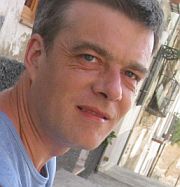In the long quest for accountability for those who ordered, authorized, or were complicit in the Bush administration's torture program, every avenue has been shut down within the United States by the Obama administration, the Justice Department, and the courts. The only hope lies elsewhere in the world, and specifically Poland, one of three European countries that hosted secret CIA prisons where "high-value detainees" were subjected to torture.
The other two countries -- Romania and Lithuania -- either have refused to accept that a secret prison existed or have opened and then prematurely shut an investigation. But Poland has an ongoing official investigation that began four years ago and shows no sign of being dismissed, even if numerous obstacles to justice have been erected along the way.
Last week, two U.S. news outlets -- the Los Angeles Times and ABC News -- reported the latest claims of Senator Jozef Pinior. ABC News explained that he told the Polish newspaper Gazeta Wyborcza that prosecutors "have a document that shows a local contractor was asked to build a cage at Stare Kiekuty." That was the Polish army base used by the CIA as its main prison for "high-value detainees" from December 2002 (when the previous prison in Thailand was closed down) until September 2003, when, for six months, the main "high-value detainees" were held in a secret prison within Guantanamo before being transferred back to facilities in Europe and Morocco. Fourteen "high-value detainees" were eventually returned to Guantanamo as military prisoners in September 2006.
"In a state with rights," Pinior said, "people in prison are not kept in cages." He added that a cage was "nonstandard equipment" for a prison, but that it was standard "if torture was used there." When he was asked "if he was sure the cage was for humans," he replied, "What was it for? Exotic birds?"
Pinior said that he had not actually seen the order for the cage but had learned that the prosecutor's office investigating the prison, which is based in Krakow, has a copy of it. He also explained that the prosecutor's office has an order signed by Zbigniew Siemiatkowski, who was the head of Polish intelligence in 2002, authorizing the establishment of the prison. ABC News claimed that a source told Gazeta Wyborcza that the agreement "has a space intended for an American signature, but that the Americans did not sign the document 'because they do not want to sign documents inconsistent with their own Constitution and international law.'" That is a rather risible conclusion, as it is the use of torture that is "inconsistent with their own Constitution and international law." A more honest analysis would have been that the United States wanted plausible deniability; that, in other words, they did not want to leave any traces of their actions.
Pinior is a key player in the Polish investigation. He worked on the EU investigation into European complicity in rendition and torture that preceded the Polish investigation, when he was first told about documents proving the prison's existence by a reliable source who explained that he had seen papers that dealt with the procedures to be followed in case any of the prisoners died. That, it should be noted, was not mentioned last week in the U.S. reports.
For his efforts, Pinior was ridiculed by an establishment that closed ranks to protect Alexander Kwasniewski and Leszek Miller, the president and the prime minister at the time of the prison's existence, although with the passage of time Pinior and his source have come to be regarded as trustworthy, even though the official denials continue.
Pinior said that he presented his evidence "with regret," because he "always valued" Kwasniewski's presidency, but to date the only senior official to be charged is Zbigniew Siemiatkowski. As was reported in March this year, Siemiatkowski has been charged with allowing prisoners of war to be subjected to corporal punishment. He has publicly acknowledged that he is under investigation, but he has refused to say more. Asked about the existence of the agreement, he said, "If my signature is on it, it means it is secret and I cannot discuss it, nor even confirm or deny its existence."
In the Los Angeles Times, there was speculation that the case might eventually "result in criminal charges" against the former political leaders, as well as Siemiatkowski. The paper noted that the story of the CIA's secret torture prison on Polish soil "has deeply shaken many Poles' faith in the United States and in Poland's sense of itself as a successful democracy born from the ashes of the Cold War," and has "damaged the reputation of the country that Poles thank for helping them to cast off Communist oppression." It was also noted that many Poles "believe the U.S. took advantage of their gratitude, loyalty and eagerness to please by setting up a torture site that it would never have allowed within its own borders."
Mikolaj Pietrzak, a lawyer who represents Abd al-Rahim al-Nashiri, one of the men held in the "black site" in Poland, said, "It's the kind of thing we expect from Soviet Russia. We remember the Soviet occupation; we remember the German occupation. The fact that this beacon of liberty which is America would allow this -- it's a great disappointment in the United States as the land of the free."
In March, the current president of Poland, Bronislaw Komorowski, declared, "The reputation of Poland is at stake. Certainly this is a sensitive and touchy issue and possibly painful for the Polish state, but it is the task of the legal apparatus to clarify this."
Despite that, lawyers, journalists, and human rights activists have complained that, as the Los Angeles Times put it, "the investigation has been halting, opaque and prone to political meddling because of its potential repercussions for U.S.-Polish relations and for prominent public figures" involved in the establishment of the prison -- most recently when, for reasons that have not been explained, the case was transferred from Warsaw to Krakow.
Mikolaj Pietrzak said that he was "frustrated by
prosecutors' refusal to give him access to classified files"
beyond the brief access he was granted when the case began. His client,
Abd al-Rahim al-Nashiri, is
accused of plotting the attack on the
"It's not a robust investigation if it takes you four years," he said, adding, crucially, "This is the single worst case of human rights violations known in Eastern Europe in the last 20 years," and that the public "has a right to know" what took place.
The exact contours of what took place do indeed need to be uncovered, to explain, for example, exactly who knew what. The Los Angeles Times noted that Polish reporters have suggested that Zbigniew Siemiatkowski "faces possible charges of exceeding his authority and abetting torture" by working with the CIA to establish the prison at Stare Kiejkuty. However, Adam Bodnar of the Warsaw-based Helsinki Foundation for Human Rights said it was "hard to believe Siemiatkowski acted on his own authority in an operation requiring coordination among the intelligence service, the military and the border control agency," although he understood that "chasing responsibility higher up the chain of command, perhaps all the way to the president's and prime minister's offices, could open a can of worms."
(Note: You can view every article as one long page if you sign up as an Advocate Member, or higher).






